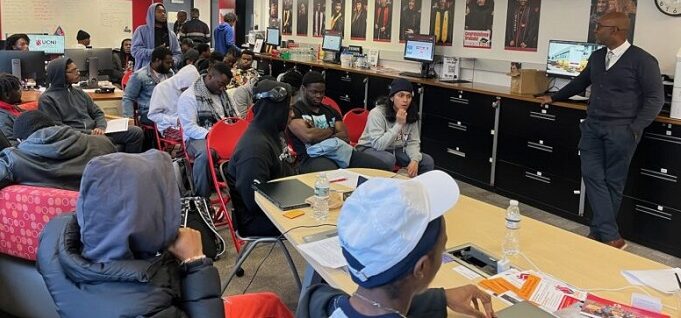Candid conversations about Black male student success
By David Tobenkin
January 17, 2024
A remarkable mentorship and wraparound services program at a New Jersey community college has allowed Black male student outcomes to catch up to those of the general student population by one measure.
Lagging Black male achievement at higher education institutions is a common problem nationally, but UCNJ Union College of Union County, NJ has largely eliminated a prior lag between the Black male graduation rate and the overall student graduation rate over the past eight years through its Project Achievement program.
Project Achievement reinforces students’ sense of belonging by connecting Black male students to professional Black male mentors; tracking each and every Black male student’s classroom performance; and providing proactive academic and career advising, tuition assistance and life skills development.
The graduation rate for Black/African-American students has risen from 5% in 2014 to 32% in 2023 (see graph, below). That is roughly comparable to the 2023 overall student graduation rate of 34.8%, which is one of the highest graduation rates for any community college in New Jersey.
“They’ve taught me so much about trusting myself, trusting my ability, reaching for the stars and to never, never stop — never stop in my work, never stop being who I am,” says Joshua Kwashie, a 19-year-old sophomore majoring in health science who participates in Project Achievement. “At one point, I was very concerned about graduating on time and they helped me get through it.”
The hole in the doughnut
Project Achievement was preceded by a more general UCNJ initiative to increase graduation rates, Operation Graduation. When UCNJ President Margaret McMenamin arrived in 2010, there were low graduation rates throughout the institution. McMenamin launched Operation Graduation in 2014, which has succeeded in raising the overall graduation rate from 5.9% in 2009, the lowest among community colleges in New Jersey at that time, to 34.8% in 2023. It did so largely by prioritizing graduation as the metric that mattered; splicing and dicing the student body into subgroups with different needs and different UCNJ responses; and then focusing on the academic needs of individual students to help them graduate.
Still, despite significant overall student graduation rate progress under Operation Graduation by 2015, the Black student graduation rate had barely improved at the college. In 2015, McMenamin launched Project Achievement, a home for all of the college’s support services for Black male students.
A program is formed
Generally, Project Achievement doubles down on the Project Graduation approach — it keeps the focus on graduation rates and a cohort approach — but adds specific additional elements to address the particular needs and challenges of Black male students. Those challenges are remarkably similar across the country, notes Demond Hargrove, UCNJ vice president of student development, a Black executive who joined the college in 2017.
“Across the country, you will find these types of data showing limited or poor attainment for African-American male students at all levels of education, K through 12,” says Hargrove. “That carries forward to college: These young men have some of the lowest graduation rate among all demographics at two-year and four-year institutions. The reasons include socio-economic issues, that they have less support and less resources, as well as racial tones and microaggressions in the classrooms.”
The challenges are so severe that only Black male role models are likely to have an impact on, and get buy-in from, young Black male students by allowing them to see that Black males can overcome such challenges and by offering ways to do so, Hargrove says.
Leading Project Achievement operations on a day-to-day basis is LaVon Williams, associate director of student success initiatives.
“We give these Black men love; we are serious about what we’re saying; we don’t allow any excuses; and we provide them with the care that we know we wish we would have had,” Williams says. “And we are as honest as possible when giving them that information. We don’t hide anything; we talk about our personal lives. And we try to lead by example.”
Participation is voluntary. However, every first-time, full-time Black male student is included in the Project Achievement cohort. Then there is follow-up, including referrals for tutoring, face-to-face advising, and classroom visits and the use of software to see how student experiences are progressing.
Students participating in the program are flooded with positive messages of Black male attainment and messages of how they can progress, from professional demeanor to dress for success. It also involves exposing them to high-ranking Black leaders in different fields discussing positions to which they can aspire. Speakers are asked to explain how they overcame adversity to achieve what they accomplished.
It also involves field trips that can expand the world of many students who have not traveled far outside of Union County.
There’s more to the story! Read the full article in CC Daily.



